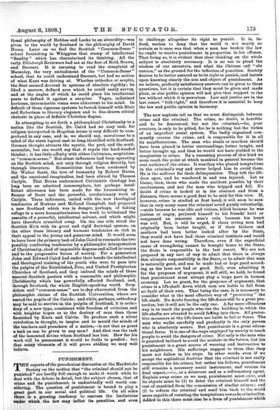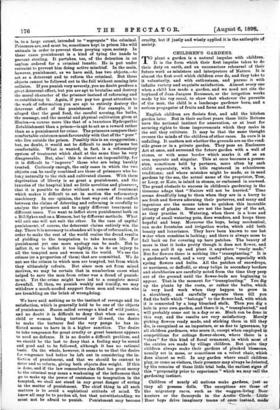PUNISHMENT.
THE reports of the paradoxical discussion at the Hardwicke Society on the motion that "the criminal should not be punished" are hardly full enough to make it worth while to deal with the debate in detail, but the subject chosen, that of crime and its punishment, is undoubtedly well worth con- sidering. The question of punishment is bound to play a great part in our social and political life. On all sides there is a growing tendency to canvass the limitations 'ander which the law may inflict its penalties, and even to challenge altogether its right to punish. It is, in- deed, useless to deny that the world is not nearly so certain as it once was that when a man has broken the law he ought to receive punishment in proportion to his offence. That being so, it is evident that clear thinking on the whole subject is absolutely necessary. It is no use to plead the wisdom of our ancestors, and what the Chinese call " olo custom," as the ground for the infliction of penalties. Society desires to be better assured as to its right to punish, and insists upon knowing clearly the aim and object of punishment As we believe, perfectly satisfactory answers can be given to these questions, but it is certain that they must be given and made plain, or else public opinion will not give that support to the law without which it is powerless. Law and justice are in the last resort "folk-right," and therefore it is essential to keep the law and public opinion in harmony.
The new sophists tell us that we must distinguish between crime and the criminal. The crime, no doubt, is horrible and to be denounced, but not the criminal—he, poor creature, is only to be pitied, for he is nothing but the victim of an imperfect 8(3681 system. The badly organised com- munity creates the crime, and is responsible for it in all its manifestations. The man who steals or murders should have been placed in better surroundings, better taught, and better brought up, and then he would not have yielded to the temptation to crime. By a reasoning process of this kind we soon reach the point at which mankind in general become the real authors of the crime. It was they who placed temptations in the criminal's way and never helped him to avoid them. He is the sufferer for their delinquencies. They left the lift- door open, and he wandered in and was injured. Let us blame, then, those who made the accident possible by their carelessness, and not the man who tripped and fell No doubt if crime is looked at in the abstract and from a distance, there seems a good deal to be said for this view. If, however, crime is studied at first hand, it will soon be seen that in very many cases the criminal acted purely voluntarily, —stole because he was idle and vicious, killed because he was jealous or angry, perjured himself to his friends' hurt or compassed an innocent man's ruin because his heart was evil. But, it will be urged, if these erring men had originally been better taught, or if their fathers and mothers had been better looked after by the State, they would not have had these criminal instincts and would not have done wrong. Therefore, even if the superficial cause of wrongdoing cannot be brought home to the State, the State is responsible in the last resort. We are not prepared in any sort of way to admit that there is always this ultimate responsibility in the State, or to admit that man is naturally good, and can be made bad or kept good accord- ing as the laws are bad or good. Still, even admitting it for the purposes of argument, it will still, we hold, be found that punishment must always play a large part in human economy. Let us grant, for the purposes of argument, that crime is a lift-shaft down which men are liable to fall from no fault of their own. That being the case, it is necessary to consider what is the most effective way of " protecting " the lift-shaft. No doubt fencing the lift-doors will be a great pro- tection, but it will not be the only one. A far more efficacious way is to teach the people who use the building in which the lift-shafts are situated to avoid faliing into them. All protec- tive measures at the lift-doors are liable to fail at times. The man who walks carefully and prudently is the only person who is absolutely secure. But punishment is a great educa- tional force. It is one of the ways employed by society to teach people to avoid the dangers of crime. Not only is the man who is punished inclined to avoid the mistake in the future, but his punishment is a great source of warning and instruction to his neighbours. His sufferings suggest to them that they must not follow in his steps. In other words, even if we accept the sophistical doctrine that the criminal is not really responsible for his crimes, but rather his fellows, punishment still remains a necessary social instrument, and retains its dual aspect,—i.e., as a deterrent and as a reformatory agent. Explain away crime as we may, punishment must exist, and its objects must be (1) to deter the criminal himself and the rest of mankind from the commission of similar crimes ; and (2) to reform the criminal and send him back to the world more capable of resisting the temptations towards criminality. Added to this there must also be a form of punishment which is, to a large extent, intended to "segregate" the criminal. Prisoners are, and must be, sometimes kept in prison like wild animals in order to prevent them preying upon society. In these cases punishment is a kind of tying the hands to prevent stealing. It partakes, too, of the detention in an asylum ordered for a criminal lunatic. He is put under restraint to prevent him doing active mischief. In the main, however, punishment, as we have said, has two objects,—to act as a deterrent and to reform the criminal. But these objects cannot be followed out to the full without coming into collision. If you punish very severely, you no doubt produce a ,great deterrent effect, bat you are apt to brutalise and destroy the moral character of the prisoner instead of reforming and re-establishing it. Again, if you pay too great attention to the work of reformation you are apt to entirely destroy the deterrent effect of the punishment. For example, it is alleged that the good food, the careful nursing, the baths, the massage, and the mental and physical cultivation given at Elmira—a course more like that of a luxurious Hydropathic Establishment than a prison—is apt to act as a reward rather than as a punishment for crime. The prisoners compare their comfortable existence most favourably with that of the "poor" who live outside the prison. Possibly this is an exaggeration ; but, no doubt, it would not be difficult to make prisons too comfortable. What is wanted, in fact, is a reformatory system of treatment which shall at the same time be very disagreeable. But, alas ! this is almost an impossibility, for it is difficult to "improve" those who are being harshly treated. Curiously enough, the only cases in which the two objects can be easily combined are those of prisoners who be- long naturally to the rich and cultivated classes. With them deprivation of liberty is so great a punishment, and the luxuries of the hospital kind so little novelties and pleasure% that it is possible to deter without a course of treatment which makes it difficult to set in motion the reformatory machinery. In our opinion, the best way out of the conflict between the claims of deterring and reforming is carefully to analyse the prisoners and to apply different treatment to different cases. You want to inflict stern punishment both on a Bill Sykes and on a Monson, but by different methods. What will snit one will not snit the other. In the case of capital punishment, of course, the deterrent claims entirely win the day. There it is necessary to abandon all hope of reformation, in order to make the rest of the world realise the dread results of yielding to the temptation to take human life. For punishment yet one more apology can be made. Not to inflict it, or to inflict it too lightly, is to do an injury to all the tempted men and women in the world. We see the crimes (or a proportion of them) that are committed. We do not see the crimes to which men are tempted, but from which they ultimately refrain. But since men act from mixed motives, we may be certain that in numberless cases what helped to save the man from crime was a dread of punish- m.nt. Yet the crime might have led to a complete moral downfall. If, then, we punish weakly and timidly, we may withdraw a much-needed support from men and women who are trembling on the brink of wrongdoing.
We have said nothing as to the instinct of revenge and its satisfaction, which is generally held to be one of the objects of punishment. Bacon called revenge a kind of wild justice, and no doubt it is difficult to deny that when one sees a child or woman being tortured or ill-used, the desire to make the torturer feel the very pangs he has in- flicted seems to have in it a higher sanction. The desire to take vengeance for great cruelty or great baseness appears to need no defence. It is no doubt a difficult problem, and we should be the last to deny that a feeling may be sound and good and to be followed, although it has no rational basis. On the whole, however, it seems to us that the desire for vengeance had better be left out in considering the in- flictien of punishment, and that we should be content to deter and to reform, giving both objects due weight. If this is done, and if the law remembers also that too great mercy to the criminal may mean a weakening of the influences that go to make up the power of resistance to temptation in the tempted, we shall not stand in any great danger cf erring in the matter of punishment. The chief thing in all such matters is to avoid a sophistical attitude of mind. To Know all may be to pardon all, but that notwithstanding, we must not be afraid to punish. Punishment may become
cruelty, but if justly and wisely applied it is the antiseptic of society.



































 Previous page
Previous page